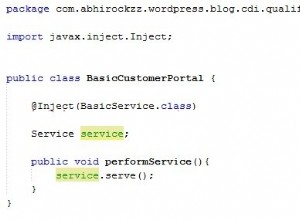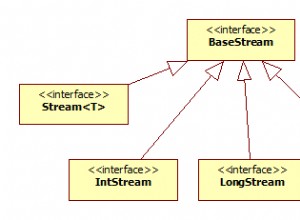Hvordan verificerer man, at alle egne runtime-undtagelser er dækket af Javadoc?
Efter at have forstået dit spørgsmål og undersøgt dette emne, fandt jeg endelig, hvad jeg troede var et af de bedste værktøjer til at udføre dette job. Med dette kan du ikke kun finde hver enkelt kast-forekomst, som du ikke har dokumenteret, men du kan også finde, hvor du ikke kaster noget, men ved et uheld dokumenterer en kastværdi.
Ideen bag dette er at parse koden til et abstrakt syntakstræ. Så kig efter metoder og kig efter kast-sætning i metoderne. Hvis en metode har en throw-sætning, skal du udtrække undtagelsesnavnet fra disse sætninger. Så få Javadoc til denne metode. Tjek Javadoc for alle @throw tags og få navnet på undtagelsen, der er blevet dokumenteret. Derefter skal du sammenligne undtagelseskastene med den, der er blevet dokumenteret. Det sidste, du er nødt til at finde ud af på egen hånd, afhænger af dine brugsforhold.
Værktøjet jeg brugte til dette er JavaParser. Du kan finde dem på Github på https://github.com/javaparser/javaparser. Jeg downloadede deres seneste version. Deres hjemmeside er på https://javaparser.org/. De skrev en bog om dette emne, og de nævnte, at du kan betale $0 dollar for bogen. Det læste jeg dog ikke, da de også har en Javadoc version til deres program som kan findes på https://www.javadoc.io/doc/com.github.javaparser/javaparser-core/3.15.1.
Jeg skrev en demonstrationskode nedenfor. På ingen måde, at denne kode er endelig. Det er blot et eksempel. Du er nødt til at ordne det, så det fungerer for din sag. Jeg tog ikke hensyn til indlejrede klasser, indlejrede metoder eller metoder inden for klasser, der er inden for en metode. Også eksempelkoden blev kun skrevet til klasse og ikke interface. Det er dog nemt at tilpasse koden til at ændre til at kunne håndtere grænseflader.
Til dette skal du downloade javaParser, bygge den og have deres javaparser-core-3.15.1.jar eller hvilken som helst version i din klassesti.
Den demonstrerede kode er nedenfor, og test.java er en fil fra et projekt, som jeg skrev, men du kan bruge enhver. Jeg inkluderede også kommentarer i eksempelkoden.
import com.github.javaparser.*;
import com.github.javaparser.ast.CompilationUnit;
import com.github.javaparser.ast.comments.*;
import com.github.javaparser.ast.stmt.*;
import com.github.javaparser.ast.body.*;
import com.github.javaparser.javadoc.*;
import java.io.IOException;
import java.nio.file.*;
import java.nio.charset.Charset;
import java.util.*;
import java.util.stream.Collectors;
class Main{
public static void main(String[] args) throws IOException {
// Set file path
Path path = Paths.get("test.java");
// Set configuration
ParserConfiguration parseConfig = new ParserConfiguration();
parseConfig.setCharacterEncoding(Charset.forName("UTF-8"));
parseConfig.setTabSize(4);
parseConfig.setLanguageLevel(ParserConfiguration.LanguageLevel.JAVA_8);
// Get the parser
JavaParser jvParser = new JavaParser(parseConfig);
// Parse the result
ParseResult<CompilationUnit> parseResult = jvParser.parse(path);
// Check for problem
if ( !parseResult.isSuccessful() ) {
System.out.print("Parsing java code fail with the following problems:");
List<Problem> problems = parseResult.getProblems();
for ( Problem problem : problems ){
System.out.println(problem.getMessage());
}
return;
}
// Get the compilationUnit
// No optional checking for Optional<CompilationUnit> due to already check above.
CompilationUnit compilationUnit = parseResult.getResult().get();
// Get Classes
List<ClassOrInterfaceDeclaration> classes = compilationUnit.findAll(ClassOrInterfaceDeclaration.class).stream()
.filter(c -> !c.isInterface())
.collect(Collectors.toList());
// Traverse through each class to get method
for ( ClassOrInterfaceDeclaration c : classes ) {
// Get methods
List<MethodDeclaration> methods = c.getMethods();
for ( MethodDeclaration method : methods ) {
// Get the body statement
Optional <BlockStmt> body = method.getBody();
// if no body continue
if ( !body.isPresent() ) continue;
// After getting the body of the method code
// Search for the throw statements.
List<ThrowStmt> throwStatements = body.get().findAll(ThrowStmt.class);
// No throw statements, skip
if ( throwStatements.size() == 0 ) continue;
// Storing name of exceptions thrown into this list.
List<String> exceptionsThrown = new ArrayList<String>();
for ( ThrowStmt stmt : throwStatements ){
// Convert the throw expression to object creation expression and get the type.
String exceptionName = stmt.getExpression().asObjectCreationExpr().getType().toString();
if ( !exceptionsThrown.contains(exceptionName) ) exceptionsThrown.add(exceptionName);
}
/*
* Debug block for up to this point
System.out.println(method.getName());
System.out.println(exceptionsThrown);
System.out.println();
*
**/
// Get The Javadoc
Optional<Javadoc> javadoc = method.getJavadoc();
// To store the throws Tags
List<JavadocBlockTag> throwTags;
// A list of thrown exception that been documented.
List<String> exceptionsDocumented = new ArrayList<String>();
if ( javadoc.isPresent() ) {
throwTags = javadoc.get()
.getBlockTags()
.stream()
.filter(t -> t.getType() == JavadocBlockTag.Type.THROWS)
.collect(Collectors.toList());
for ( JavadocBlockTag tag : throwTags ) {
/*
* This may be buggy as
* the code assumed @throw exception
* to be on its own line. Therefore
* it will just take the first line as the exception name.
*/
String exceptionName = tag.getContent().toText()
.split("\n")[0]; // Use system line separator or change
// line accordingly.
if ( !exceptionsDocumented.contains(exceptionName) )
exceptionsDocumented.add(exceptionName);
}
}
// getBegin can extract the line out. But evaluating the optional would take some more code
// and is just for example so this was done like this without any checking.
System.out.println("Method: " + method.getName() + " at line " + method.getBegin());
System.out.println("Throws Exceptions: ");
System.out.println(exceptionsThrown);
System.out.println("Documented Exceptions:");
System.out.println(exceptionsDocumented);
System.out.println(System.lineSeparator() + System.lineSeparator());
}
}
}
}
test.java-indhold:
package host.fai.lib.faiNumber;
/*
* Copyright 2019 Khang Hoang Nguyen
*
* Permission is hereby granted, free of charge, to any person obtaining
* a copy of this software and associated documentation files
* (the "Software"), to deal in the Software without restriction,
* including without limitation the rights to use, copy, modify, merge,
* publish, distribute, sublicense, and/or sell copies of the Software,
* and to permit persons to whom the Software is furnished to do so,
* subject to the following conditions
*
* The above copyright notice and this permission notice shall be
* included in all copies or substantial portions of the Software.
*
* THE SOFTWARE IS PROVIDED "AS IS", WITHOUT WARRANTY OF ANY KIND,
* EXPRESS OR IMPLIED, INCLUDING BUT NOT LIMITED TO THE WARRANTIES OF
* MERCHANTABILITY, FITNESS FOR A PARTICULAR PURPOSE AND
* NONINFRINGEMENT. IN NO EVENT SHALL THE AUTHORS OR COPYRIGHT HOLDERS
* BE LIABLE FOR ANY CLAIM, DAMAGES OR OTHER LIABILITY, WHETHER IN AN
* ACTION OF CONTRACT, TORT OR OTHERWISE, ARISING FROM, OUT OF OR IN
* CONNECTION WITH THE SOFTWARE OR THE USE OR OTHER DEALINGS IN THE
* SOFTWARE.
**/
/**
* <p>The <code>Base2Util</code> class is a final class that provides
* static methods for converting base 2 numbering system values in
* string representation to a Java's Primitive Data Type.
*
* <p>Currently this class supports converting base 2 numbers values
* in string representation to integer int values and integer
* long values.
*
* <p>This class can parse unsigned base 2 numbers to a supported
* integer signed type as if the integer type is unsigned. However,
* some of the values must be interprete properly to get the correct
* result.
*
* <p>Example for interpreting signed value as unsigned value.
*
* <p>It is possible to store the value of 18446744073709551615L
* into a long(signed) value. However, if that value is stored into a
* signed long integer type and if we were to interprete the value
* normally, we would get a -1L value. However, if the -1L value is
* pass to LongUtil.toStringAsUnsigned, we would get
* 18446744073709551615 in string format.
*
* <p>The following example is to get to -1L. First, we assign a value
* of 9223372036854775807L to an interger long variable, multiply that
* variable to 2L, and add 1L to it.
* <pre>
* long a = 9223372036854775807L * 2L + 1L;
* System.out.println(a);
* System.out.println(LongUtil.toStringAsUnsigned(a));
* </pre>
*
* <p>Example methods for interprete signed type as unsigned type
* in a decimal strings value are
* {@link IntUtil#toStringAsUnsigned(int) IntUtil.toStringAsUnsigned}
* and {@link LongUtil#toStringAsUnsigned(long) LongUtil.toStringAsUnsigned}.
* </p>
*
* @author Khang Hoang Nguyen
*
* @since 1.0.0.f
**/
public final class Base2Util{
private Base2Util(){};
/**
* Parse the input string as signed base 2 digits representation
* into an integer int value.
*
* @param input
* A string to be parsed as signed base 2 number to an
* integer int value.
*
* @return An integer int value of the signed base 2 number
* {@code input} string.
*
* @throws NumberFormatException
* If the {@code input} string contains invalid signed
* base 2 digits, if the {@code input} string contains a
* value that is smaller than the value of Integer.MIN_VALUE(
* {@value java.lang.Integer#MIN_VALUE}),
* or if the {@code input} string contains a value that
* is larger than the value of Integer.MAX_VALUE(
* {@value java.lang.Integer#MAX_VALUE}).
*
* @throws EmptyStringException
* If the {@code input} string is empty.
*
* @since 1.0.0.f
**/
public static final int toInt(final String input){
final int length = input.length();
if ( length == 0 ) throw new EmptyStringException();
final char ch1 = input.charAt(0); int start;
if ( ch1 == '-' || ch1 == '+' ){
if ( length == 1 ) throw new NumberFormatException(input);
start = 1;
} else {
start = 0;
}
int out = 0, c;
while ( start < length && input.charAt(start) == '0' ) start++;
final int runlen = length - start;
if ( runlen > 31 ){
if ( runlen > 32 ) throw new NumberFormatException(input);
if ( ch1 != '-' ) throw new NumberFormatException(input);
if ( input.charAt(start++) != '1') throw new NumberFormatException(input);
for ( ; start < length; start++){
if ( input.charAt(start) != '0' ) throw new NumberFormatException(input);
}
return -2147483648;
}
for ( ; start < length; start++){
c = (input.charAt(start) ^ '0');
if ( c > 1 ) throw new NumberFormatException(input);
out = (out << 1) | c;
}
if ( ch1 == '-' ) return ~out + 1;
return out;
}
/**
* Parse the input string as unsigned base 2 number representation
* into an integer int value as if the integer int is an unsigned
* type. For values that need to be interpreted correctly, see the
* {@link IntUtil#toStringAsUnsigned(int) toStringAsUnsigned} method
* of the {@link IntUtil IntUtil} class.
*
* @param input
* A string to be parsed as unsigned base 2 number to an
* integer int value as if the integer int is an unsigned
* type.
*
* @return An int value that represents an unsigned integer int
* value of the unsigned base 2 number {@code input} string.
*
* @throws NumberFormatException
* If the {@code input} string contains invalid unsigned
* base 2 digits, if the {@code input} string contains a
* value that is beyond the capacity of the integer int
* data type.
*
* @throws EmptyStringException
* If the {@code input} string is empty.
*
* @since 1.0.0.f
**/
public static final int toIntAsUnsigned(final String input){
final int length = input.length();
if ( length == 0 ) throw new EmptyStringException();
int start = 0;
int out = 0, c;
while ( start < length && input.charAt(start) == '0' ) start++;
if ( length - start > 32 ) throw new NumberFormatException(input);
for ( ; start < length; start++){
c = (input.charAt(start) ^ '0');
if ( c > 1 ) throw new NumberFormatException(input);
out = (out << 1) | c;
}
return out;
}
/**
* Parse the input string as signed base 2 number representation
* into an integer long value.
*
* @param input
* A string to be parsed as signed base 2 number to an
* integer long value.
*
* @return An integer long value of the signed base 2 number
* {@code input} string.
*
* @throws NumberFormatException
* If the {@code input} string contains invalid signed
* base 2 digits, if the {@code input} string contains a
* value that is smaller than the value of Long.MIN_VALUE(
* {@value java.lang.Long#MIN_VALUE}), or if
* the {@code input} string contains a value that is larger
* than the value of Long.MAX_VALUE(
* {@value java.lang.Long#MAX_VALUE}).
*
* @throws EmptyStringException
* If the {@code input} string is empty.
*
* @since 1.0.0.f
**/
public static final long toLong(final String input){
final int length = input.length();
if ( length == 0 ) throw new EmptyStringException();
final char ch1 = input.charAt(0); int start = 0;
if ( ch1 == '-' || ch1 == '+' ){
if ( length == 1 ) throw new NumberFormatException(input);
start = 1;
}
long out = 0, c;
while ( start < length && input.charAt(start) == '0' ) start++;
final int runlen = length - start;
if ( runlen > 63 ){
if ( runlen > 64 ) throw new NumberFormatException(input);
if ( ch1 != '-' ) throw new NumberFormatException(input);
if ( input.charAt(start++) != '1') throw new NumberFormatException(input);
for ( ; start < length; start++){
if ( input.charAt(start) != '0' ) throw new NumberFormatException(input);
}
return -9223372036854775808L;
}
for ( ; start < length; start++){
c = (input.charAt(start) ^ '0');
if ( c > 1L ) throw new NumberFormatException(input);
out = (out << 1) | c;
}
if ( ch1 == '-' ) return ~out + 1L;
return out;
}
/**
* Parse the input string as unsigned base 2 number representation
* into an integer long value as if the integer long is an unsigned
* type. For values that need to be interpreted correctly, see the
* {@link LongUtil#toStringAsUnsigned(long) toStringAsUnsigned} method
* of the {@link LongUtil LongUtil} class.
*
* @param input
* A string to be parsed as unsigned base 2 number to an
* integer long value as if the integer long is an unsigned
* type.
*
* @return An integer long value represent the unsigned integer
* long value of the unsigned base 2 number {@code input}
* string.
*
* @throws NumberFormatException
* If the {@code input} string contains invalid unsigned
* base 2 digits, or if the {code input} string
* contains a value that is beyond the capacity of the
* long data type.
*
* @throws EmptyStringException
* If the {@code input} string is empty.
*
* @since 1.0.0.f
**/
public static final long toLongAsUnsigned(final String input){
final int length = input.length();
if ( length == 0 ) throw new EmptyStringException();
int start = 0;
long out = 0, c;
while ( start < length && input.charAt(start) == '0' ) start++;
if ( length - start > 64 ) throw new NumberFormatException(input);
for ( ; start < length; start++){
c = (input.charAt(start) ^ '0');
if ( c > 1L ) throw new NumberFormatException(input);
out = (out << 1) | c;
}
return out;
}
}
Hvis jeg forstår dit spørgsmål korrekt, overtræder du formålet med RuntimeException .
Som forklaret i tråden her, er RuntimeException(s) dem, der ikke formodes at blive håndteret af klienten. Det er snarere en situation, hvor klienten ikke kan komme sig. I sådanne tilfælde er alt, hvad han kan gøre, enten at opgive ansøgningen eller kaste fejlen tilbage. Hvis du tilføjer dokumentation for at dække disse undtagelser, betyder det, at du udmærket ved, hvorfor denne undtagelse opstår. I sådanne tilfælde bør det kontrolleres undtagelse, og ikke ukontrolleret.
Så teknisk set vil intet bibliotek levere den funktionalitet, du leder efter, da runtime-undtagelser ikke forventes at blive dokumenteret. Det er en design lugt. så det er bedre at rette designet, end at tilføje dokumentation.
Hvis det ikke er muligt, og du insisterer på at bruge RuntimeException kun, så vil jeg anbefale at se på dette svar og bygge din egen Findbugs/checkstyle-regel, der vil gøre det trick.



